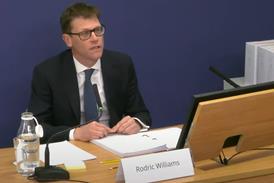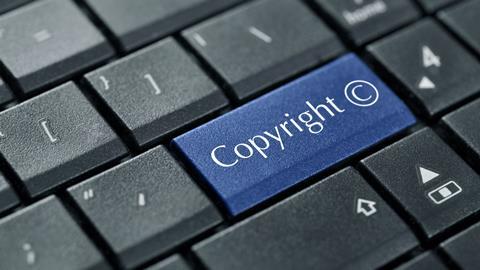Everything a computer does includes copying; data is processed, written to memory, retrieved, and transmitted.

Copyright is infringed when the 'expression of the intellectual creation of the author of the work' is copied.
So in order to allow the internet to function, the EU passed an exception in copyright law that allows temporary copying when that copying forms part of a transmission of a copyright work in a network.
However, there isn’t any express exception that allows artificial intelligence (AI) to read documents.
This isn’t an issue for people – we don’t 'copy' documents in the same way to read them. Perhaps use by AI would fall within exhaustion of rights – once a book has been sold, it can be read by both man and machine.
But behind this is a bigger question: what use by AI of a copyright work should be allowed? Copyright does not protect ideas; it protects the expression of ideas. But drawing a neat line between the two has always been difficult.
Machine learning software, using artificial neural networks, can learn from information it receives and reach decisions on its own volition, with limited or no human intervention. AIs have been trained to paint like Rembrandt and compose like Bach. When a machine, which is trained only on one author’s works, goes on to make similar work, is it not copying something protected by copyright?
So, AI may make it easier to create something new but similar from large scale digital copying. As image recognition is used to search for products, will it also get easier to create and sell lookalike products?
When alternate products are sold from the results of an image search, all the retailer needs is something that looks like the product being searched for to increase the prospects of sale of their own products.
Perhaps this is just an old issue in new clothes; ASOS started as ‘AsSeenOnStars’, selling imitations of celebrity clothing, and a number of major retailers have built their business models around lookalikes.
AI will make it easier to create lookalikes and will automate and make it easier for consumers to find lookalikes.
AI creating copyright works
This also leads us back to the problem of whether copyright should subsist in AI generated works. EU jurisprudence says that copyright protects intellectual creations and that ‘an intellectual creation is an author’s own if it reflects the author’s personality’. The Advocate General in Painer C-145/10 has explicitly said that only human creations are protected.
The UK’s Copyright, Designs and Patents Act 1988 provides for computer generated works to be protected by copyright. So, EU case law and UK statute are incompatible, perhaps because neither is designed with AI generated works in mind.
UK law expressly excludes computer generated works from holding moral rights. Perhaps the paternity right for computer generated works would be a good thing to keep people honest, even if the computers don’t care.
News organisations are using machines to interpret data, detect trends and generate articles – including Bloomberg’s Cyborg, Forbes’ Bertie and the Washington Post’s Heliograf.
Retail and trade marks
AI is changing our shopping habits. Smart assistants can order goods; smart fridges can keep us stocked with fresh milk; AI fashion assistants can tell us what to wear. However, when I ask Alexa for an iPhone charger or a Nintendo Switch charger, it tells me that it has put a compatible charger in my basket. If I ask Siri for the BBC weather forecast, it shows me results from the iPhone’s weather app.
These issues are an extension of the ones consumers already encountered when shopping online. We know that if we enter 'Canon camera' into Google, we may be shown results for Nikons.
Using a trade mark in an advertisement is not trade mark infringement if the advert enables 'normally informed and reasonably attentive internet users' to ascertain whether the goods or services referred to in the ad originate from or are connected with the proprietor of the mark.
To avoid trade mark issues, AI platforms will have to inform consumers about the products they are being offered. Brand owners will have to ensure consumers still care about what brand they are purchasing.
Innovations involving AI
AI will transform the future, but the patent system retains vestigial features from the 19th Century. The last article discussed whether AI should be an inventor and how AI makes it difficult to assess obviousness.
Core AI – an algorithm – is not patentable 'as such', but patent protection can be granted if it is applied in a field and a technical effect can then be shown.
AI patents are being granted - the UK Intellectual Property Office’s (UKIPO) 2019 report on AI patenting found that in 2017, almost 30,000 AI related patent applications were published worldwide. This is double the amount published in 2015.
Augmenting advice
In the context of some of this future gazing, it seems almost mundane to return to the present, but it’s worth noting that AI is here already and is already helping lawyers with patent and trade mark searches.
IP offices are also using AI initiatives to support searching and examination. Clearance searches are good practice, but they add cost and time, which can stifle innovation and creativity. One hopes that AI can make this easier.
The UKIPO has now launched a call for views to better understand the implications AI may have for IP policy. It raises a number of these queries, and others. AI will mean change and challenge, and this is a good opportunity to improve the UK’s legal system to anticipate these.
Giles Parsons is a member of the Law Society’s intellectual property committee

















![David Lester (senior partner at Blythe Liggins), Darryl Barnes, Jagdeep Sandher (head of dispute resolution at Blythe Liggins)[4]](https://d1d8vslyhr7rdg.cloudfront.net/Pictures/274x183/4/2/8/116428_davidlesterseniorpartneratblytheligginsdarrylbarnesjagdeepsandherheadofdisputeresolutionatblytheliggins4_981603_crop.jpg)










1 Reader's comment